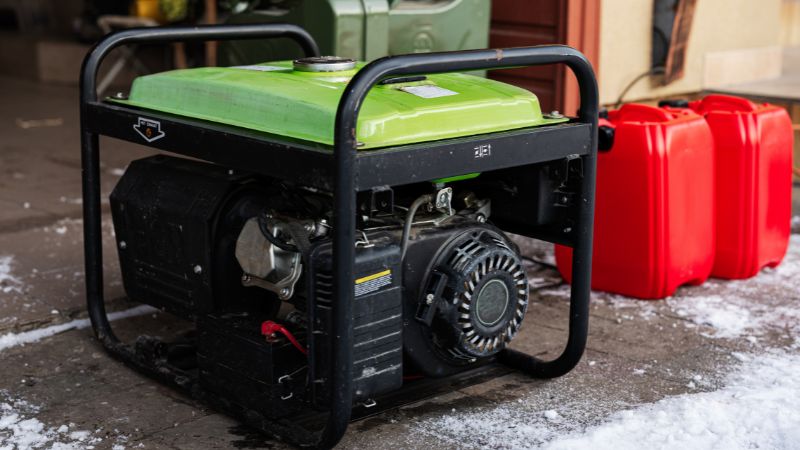If you’re tired of running noisy generators or dealing with high fuel costs, a hybrid generator might be what you’re looking for. This guide will explore the essentials of hybrid generators, their working principle, benefits, different types, and how to choose the right generator.

What is a Hybrid Generator?
A hybrid generator is an innovative type of generator. It combines conventional fuel – powered sources, like diesel or gasoline engines, with renewable energy systems such as solar panels, wind turbines, or battery storage.
This integration offers greater flexibility and enhanced efficiency. With it, you can enjoy the advantage of a reliable power supply while having the choice to reduce fuel consumption and operate more quietly.
How Hybrid Generators Work?
A hybrid generator works by combining multiple power – generating sources, typically a conventional fuel – based engine (like a diesel engine) and a renewable energy source (such as solar panels or a wind turbine).
The fuel – based engine provides a stable and reliable power output, while the renewable source contributes additional energy when conditions are favorable.
This combination aims to reduce fuel consumption, lower emissions, and enhance the overall reliability and sustainability of power generation.
Key Components of Hybrid Generators
A hybrid generator usually has several main parts: an engine (runs on fuel like diesel or gas), a battery storage system, and a control unit (often called an inverter). The engine provides backup or extra power, while the batteries take over when loads are small or during quiet times.
Typical components include:
- Engine: Main power source using traditional fuel.
- Battery pack: Stores electrical energy for quieter, low-load running.
- Inverter/controller: Switches between power sources and manages charging.
- Solar input (optional): Lets you add solar panels for extra charging.
Different Types of Hybrid Generators

Hybrid generators can use different sources of power, like solar, diesel, gas, batteries, and wind. Each type is unique in how it works and when you might want to use it.
Solar and Diesel Hybrid Generators
Solar and diesel hybrid generators mix solar panels with diesel engines.
In sunny weather, the solar panels collect sunlight and turn it into electricity, which powers your devices or charges batteries.
When the sun goes down or if your energy needs go up, the diesel engine kicks in to supply extra power.
Pros:
- Saves fuel
- Lowers emissions
- Reliable power anytime
Gas and Battery Hybrid Generators
Gas and battery hybrid generators combine a gas-powered engine with a battery pack. If you use a lot of power or the battery gets low, the gas engine starts up and recharges the battery.
This setup works well if you need backup power that’s clean and quiet sometimes, but still want the strong performance of a gas engine.
Key benefits:
- Quieter during battery use
- Reduces gas use
- Long runtime with both power sources
Wind and Hybrid Power Systems
Wind and hybrid power systems tie together wind turbines with other sources like diesel or solar power.
When the wind blows, the turbine makes electricity, either powering your stuff or charging the batteries. If the wind dies down, a backup source—usually diesel or solar— fills in the gap.
This type is helpful in places with steady wind but not enough sunlight or fuel supply. You get steady, renewable power most of the time, and don’t have to rely only on one kind of energy.
Features:
- Uses wind as the main source
- Backup from diesel or solar
- Good for windy, remote areas
Benefits of Hybrid Generators

Hybrid generators give you more than just backup electricity. They help you save fuel, lower your expenses, protect the environment, and keep noise down during operation.
Energy Efficiency
By integrating renewable energy sources like solar panels or wind turbines, hybrid generators can reduce the amount of fuel needed to run the diesel engine.
This can lead to substantial fuel savings, especially in remote locations where fuel delivery is expensive.
Reduced Emissions
The use of renewable energy sources in hybrid generators significantly lowers greenhouse gas emissions compared to traditional diesel – only generators.
Solar and wind power produce no carbon dioxide emissions during operation. Even when the diesel engine is used, it can run less frequently and at a more efficient load, further reducing emissions.
Noise Reduction
Hybrid generators can be quieter than traditional diesel generators. When the diesel engine is not in use and the system is running on renewable energy or battery power, the noise level is significantly lower.
This is particularly beneficial in residential areas, hospitals, or other places where noise pollution is a concern.
Lower Operating Costs
Although the initial cost of a hybrid generator may be higher than that of a traditional diesel generator, the long – term operating costs can be significantly lower.
The savings from reduced fuel consumption and lower maintenance costs (due to less frequent engine operation) can offset the initial investment over time.
Scalability
It’s relatively easy to scale up a hybrid generator system. Additional solar panels, wind turbines, or battery storage units can be added as the power demand increases or as the budget allows.
This modular approach makes it suitable for applications where the power requirements may change over time.
How to Choose a Right Hybrid Generator?
Picking the right hybrid generator means looking at your specific electricity needs and the fuel sources that fit your situation best. These factors help you avoid wasting money or ending up with too much or too little power for your daily life.
Assessing Your Power Needs
Start by figuring out which devices, tools, or systems you plan to run. Make a list of appliances, their wattages, and how many hours you use them each day. Include everything from lights and refrigerators to chargers or air conditioners.
Here’s an easy way to estimate your total usage:
- Add up the wattages of items you need at the same time
- Multiply each item’s wattage by hours used to get watt-hours
- Total these up to estimate daily power needs
Considering Fuel Sources
Hybrid generators usually run on a mix of fuel options like diesel, gasoline, propane, or solar power. Each type has pros and cons, so what you pick should match what’s easy to find, clean to use, and safe for your needs.
Diesel and gasoline are common for backup power but can be noisy and need more maintenance. Propane burns cleaner and stores well, making it great for home or RV use.
Some hybrid systems combine fuel options with solar or batteries, letting you use less fuel and cut costs. Choosing the right mix makes your system more flexible and can help save money, especially where renewable energy is a priority.
Conclusion
Hybrid generators offer a versatile, efficient, and environmentally friendly solution for your power needs.
At GretechPower, we specialize in delivering high – quality generators tailored to meet your specific requirements. With GretechPower, you can trust that you’re investing in a future – proof solution that will serve you well for years to come.
